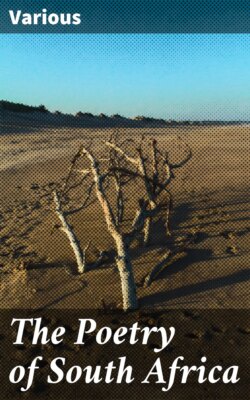Читать книгу The Poetry of South Africa - Various - Страница 3
На сайте Литреса книга снята с продажи.
ОглавлениеPREFACE.
Table of Contents
THIS collection of verse has been made from various sources in the Cape Colony, Natal, and the Transvaal, and it is a matter of regret that many pieces of interest have been omitted owing to the difficulty of obtaining copies. Also as most colonists in South Africa understand the Dutch language “as spoken there,” it could be wished that certain well-known productions in the “Boerentaal” could have been preserved in these pages. Some of the inimitable “versions” of Reitz—for instance, his rendering of “Tam o’ Shanter” and “The Maid of Athens,” and some others which have appeared from time to time, we believe, in one of the Cape journals, ought not to be forgotten.
We have received from Natal, since this volume was “in the press,” some lines by the late T. Fannin, who used in the olden days to sing his own rhymes in right good style. We do not apologise to our readers for giving these in their entirety.
“THE SMOUSE.”
Table of Contents
“I’m a Smouse, I’m a Smouse in the wilderness wide—
The veld is my home, and the wagon’s my pride;
The crack of my “voerslag,” shall sound o’er the lea.
I’m a Smouse, I’m a Smouse, and the trader is free!
I heed not the Governor, I fear not his law,
I care not for ‘civilisation’ (?) one straw—
And ne’er to ‘Ompanda’—‘Umgazis’ I’ll throw,
While my arm carries fist, or my foot bears a toe!
‘Trek,’ ‘trek,’ ply the whip—touch the fore oxen’s skin,
I’ll warrant we’ll ‘go it’ through thick and through thin—
‘Loop! loop ye oud skellums! ot Vigmaan trek jy.’
I’m a Smouse, I’m a Smouse, and the trader is free!
They may talk of quick going by mail or by rail—
What matters? our wagon creeps on like a snail;
What to ‘her’ is the steam-engine’s whistle and din?
We have time all before, and the ‘prog’ all within—
The snows of Kathlamba our progress can’t stay;
We mount to its summit, and travel away,
Or go we by Biggarsberg—wagon upset,
The tent lies in atoms, the stuff is all wet—
Never mind, that won’t hurt us—we’ll soon get it dry.
But ho! there go Elands—saddle up, boys! mount! fly!
Load your rifles, give chase as they bound o’er the lea—
I’m a Smouse, I’m a Smouse, and the trader is free!
I’m alone—I’m alone, and ’tis night on the plain—
And I think, as I lie, of old England again;
The jackal cries round me, the wolf quits his lair,
And the roar of the lion resounds through the air—
‘Alamagtig!’ cries Jansi—‘Ma-wo!’ cries Kewitt;
The cattle stand trembling—the Smouse on his feet.
My ‘Lancaster’ rings, while the brute gives a bound,
And the king of the desert lies dead on the ground!
Hurrah! then, what care I for king or for prince?
My horse and my gun are my pride and defence;
The town for the coward—the desert for me!
I’m a Smouse, I’m a Smouse, and the trader is free!”
All is changed since these lines were written, and since Pringle (the “father” of South African verse) “sang” amid the wild surroundings of his home. The whistle of the locomotive has taken the place of the shrill cry of the Kaffir. The lion has retired from business. The “big game” which used to cover the plains beyond the Drachensberg has gone, never to return; and the wandering trader has to pay taxes, and is no longer in need of a gun. The railway from Delagoa Bay to the Portuguese border is almost completed. Soon “excursions to Ophir” will be advertised, and the romance of the “Dark Continent” will be dead! There is little time for thought or rest in a country which can show a town risen up, as by Aladdin’s power, in a few short months, holding five thousand people, all gathered together for one object—gold.[1] Still, and in spite of all this, we hope our modest volume may not be wholly neglected, but will find a welcome in many a home. There must be “intervals for refreshment,” however transient, both for body and mind, even in a world where the “go as you please” race for wealth engages everybody, and we trust that many colonists will find something in these pages to satisfy their tastes even if it be only a reminder of the days when their fathers were young, and ventured over the sea to make for themselves homes in untrodden wilds.
B.
24th September 1887.
